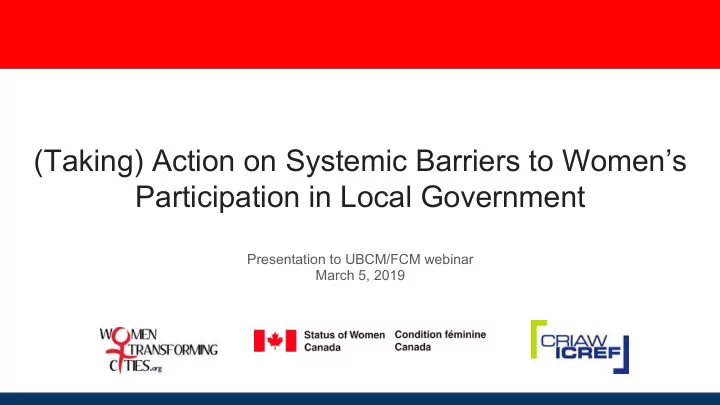

(Taking) Action on Systemic Barriers to Women’s Participation in Local Government Presentation to UBCM/FCM webinar March 5, 2019
Our Project “(Taking) action on systemic barriers to women’s participation in local government” Funded by Status of Women Canada ● Vancouver and Surrey ● Studying: 1. Candidates and elected officials 2. Advisory bodies 3. City staff 4. Public engagement strategies We have also conducted a literature review to provide an overview of the identified barriers to women’s involvement in local governance and strategies to overcome those barriers.
Intersectionality in Research and Analysis Intersectionality attempts to understand how multiple forces work together and interac t to reinforce conditions of inequality and social exclusion. Intersectionality examines how factors including socio-economic status , race , class , gender , sexualities , ability , geographic location , and refugee and immigrant status, among others combine with broader historical and current systems of discrimination, such as colonialism and globalization, to simultaneously determine inequalities among individuals and groups.
1. Candidates and Elected Officials What we’re doing: ● Data collection on women candidates and electeds over time ● Interviews with women who ran for office and/or were elected ● Interviews with civic parties ● Public forums in each city ● Analysis of data on how electoral systems and voter turnout and demographics impact the election of women from diverse back- grounds
1. Candidates and Elected Officials
1. Council Composition—Surrey 2018 Surrey City Council Electeds Surrey Population Surrey Councillor Candidates 22% 42% 58% 78% 50% 50% Non-Caucasian/White Caucasion/White
1. Council Composition--Vancouver Vancouver City Council Vancouver Population Electeds Vancouver Councillor Candidates 10% 32% 48% 52% 68% 90% Non-Caucasian/White White/Caucasian
1. Candidates and Elected Officials Barriers: Supports/opportunities: ● Financing a campaign § Civic party support for women candidates ● Time constraints (e.g., shift work) § Personal support network (family, volunteers) ● Child/family care responsibilities § Mentoring by women with experience running ● Racism/ tokenism and misogyny for/holding office ● Societal and cultural attitudes re: women’s § Info sessions/training for potential women “place” and role and abilities candidates on how the electoral system works ● Electoral system: FPTP; lack of a ward system; § Previous experience with City functions (public low voter turnout events, committee membership) § Passion for a particular cause (e.g., quality of education for children)
2. Advisory Bodies What we’re doing: ● Vancouver: ○ On-line survey of current and former advisory body members; follow up interviews ○ Historical analysis of gender composition of advisory body members ● Surrey: ○ Interviews with current advisory body members
2. Advisory Bodies Findings so far: ● Each city should have a permanent Women’s Advisory Committee that cannot be disbanded by a new council ● All advisory bodies should have at least 50% women, and be reflective of the diversity of the city’s population ● New members need thorough orientation to enhance their understanding of the advisory body’s role, responsibilities, and the limits of its ability to influence policy ● Members should be given the tools to track their influence; participation and “input” are not enough ● Meetings should have a flexible schedule, to accommodate various members’ schedules ● Support for child/family care and transportation should be available for members that require it ● Advisory bodies need administrative support from the city, e.g., dedicated staff resources
3. City Staff What we’re doing: ● Data collection on number of women in leadership/ management positions ● Interviews with unions representing staff employees ● Vancouver: on-line survey with over 300 senior management, in collaboration with City ‘s implementation of its objectives as part of the Women’s Equity Strategy
3. City Staff: Vancouver From the City of Vancouver Women’s Equity Strategy (2018-2028)
4. Public Engagement Strategies What we’re doing: ● Vancouver: ○ Review major Talk Vancouver reports for data on participation ○ Review City-provided analysis of public input received as part of the Women’s Equity Strategy public engagement efforts ○ Review other public engagement strategies of the City: Pop-Up City Hall, Doors Open Vancouver, City 3-1-1 ● Surrey: ○ Survey of 32 community organizations to determine their perspectives on strengths/weaknesses of public engagement strategies and methods
4. Public Engagement Strategies ● 15,187 members ● Gender: 46% male, 52% female, 2% prefer not to say ● Ethnic origins: 43% European, 41% Canadian, 11% Chinese, 5% American, 3% South Asian, 3% Other Asian, 2% First Nations, 2% Latin/South American ● 25% had children under age 18 ● 45% were renters, and 51% owed their homes (4% other)
4. Public Engagement Strategies Findings so far—cities should: ● Collect demographic information on who participates in their consultations, including at in-person events, to identify underrepresented groups ● Conduct outreach with underrepresented groups and work with city advisory bodies and community organizations to ensure greater inclusiveness and representation ● Consider holding some engagement activities for women only, in spaces where women can safely express their views ● Hold in-person consultations at locations that are easily accessible via public transit, and at times that can accommodate the needs of families and seniors—providing childcare would be wise practice ● Provide public engagement materials in languages other than English, and translation services at public events
Final Product: Assessment and Actions Following the completion of our assessment for the four areas for each City, we intend to: ● Present our findings to each city emphasizing both what is working well and what could be improved ● Recommend actions which could include: ○ The development of policies and practices to include diverse women’s voices in all areas of City decision-making, e.g., Vancouver’s recent development of a Diversity on Advisory Bodies Strategy ○ The development of strategies that cities can use to conduct voter outreach and education prior to civic elections specifically focusing on underrepresented groups, e.g., Vancouver’s outreach program prior to 2018 election ○ The establishment of processes for collaborative and on-going evaluation of City programs related to equity/diversity that privilege the voices of diverse women
Thank you!
Recommend
More recommend